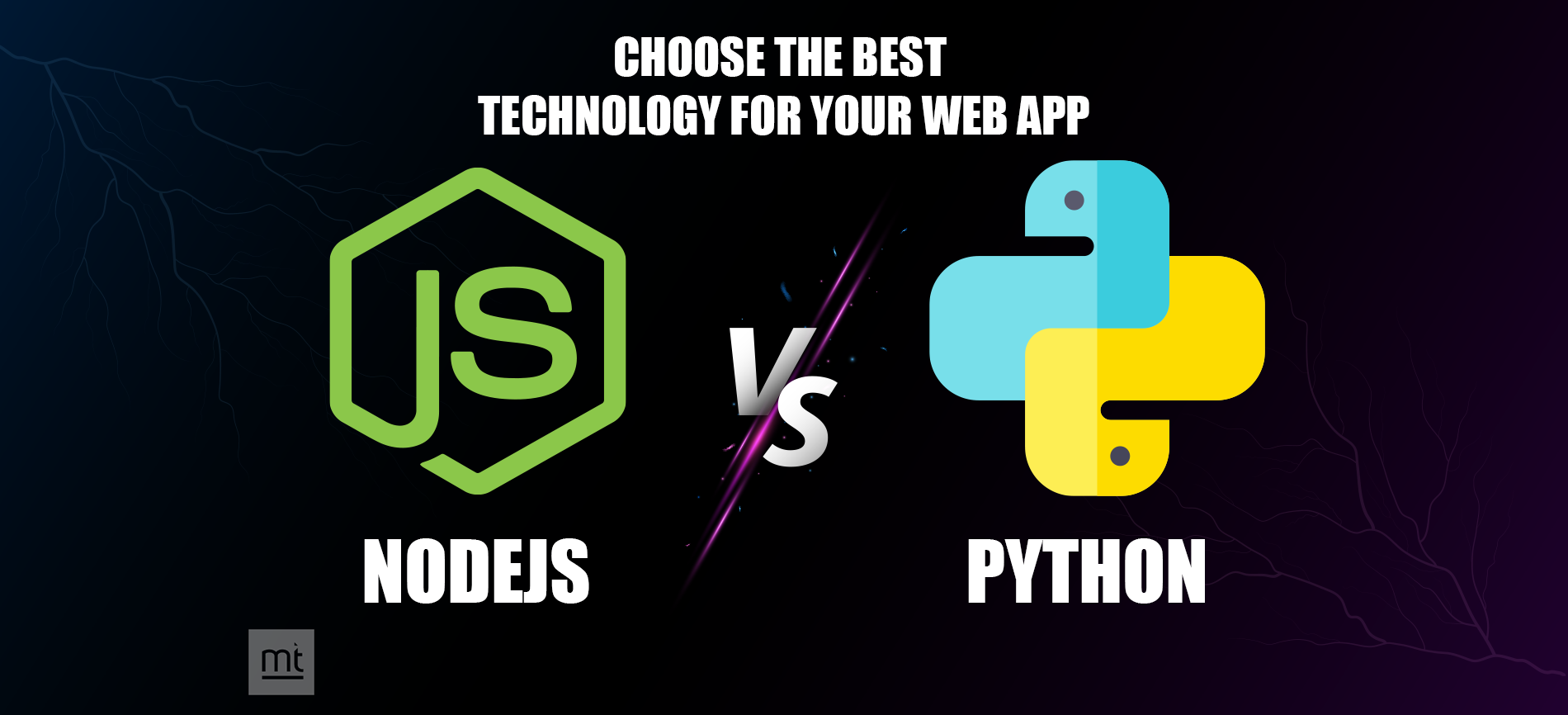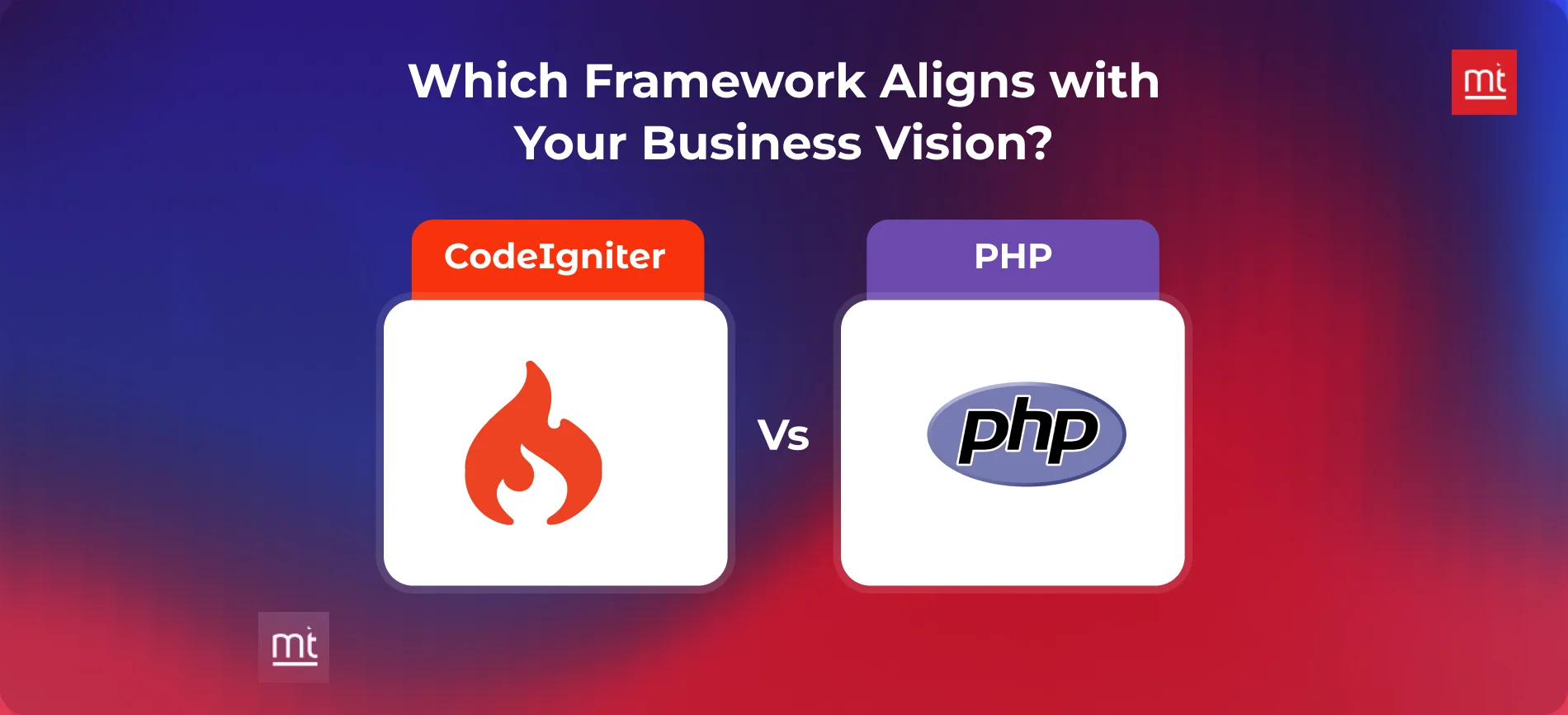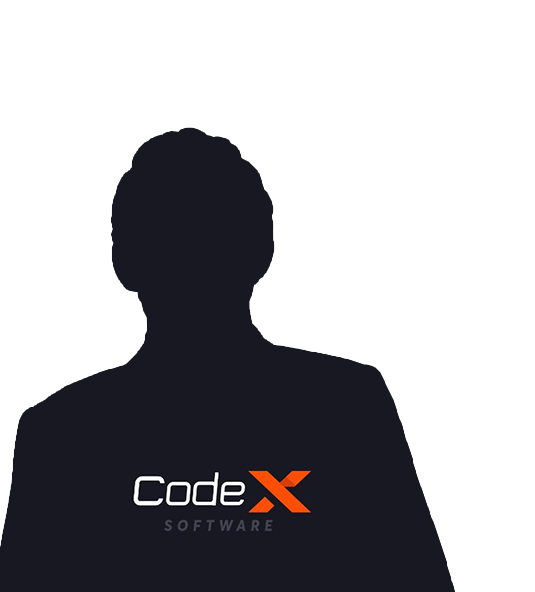Get Free Trial Week Developer Access, Try Before You Hire. Click Here to Claim Now
Introduction:
When it comes to software development, developers prefer two programming languages. Choosing the correct programming language is vital to developing feature-rich, scalable, versatile, and user-centric software or web applications.
If you are a developer, it would be a challenge for you to choose the correct programming language. Would you prefer PHP development services or Python? Who will you choose? Experienced developers might have their personal preferences.
For example, a developer with intense PHP experience might still prefer PHP. However, such decisions impact the development process and business objectives you want to achieve. From Python vs PHP, what would you choose?
The answer lies within. To make the right decision, you must understand both programming languages, their pros and cons, features, and use cases.
Once you understand these languages, you will know which programming language is correct for your project.
This post discusses PHP and Python and everything you need to know about these languages. Once you go through this post, you will be able to know which programming language to choose for your project.
What is PHP?
Does PHP need an introduction? It is one of the most preferred and loved programming languages to build scalable, SEO-friendly, and feature-rich software and web applications. Being an open-source language, PHP offers a large number of plugins and themes to developers to create highly versatile applications. Not only that, but developers can also build custom plugins and themes based on their project requirements.
Primarily used for server-side web development, PHP has an easy and linear learning curve. In addition to that, it is easier to hire PHP developers with extensive experience and expertise than Python developers.
Features of PHP:
PHP offers developers and businesses a wide range of valuable features. Let's check out
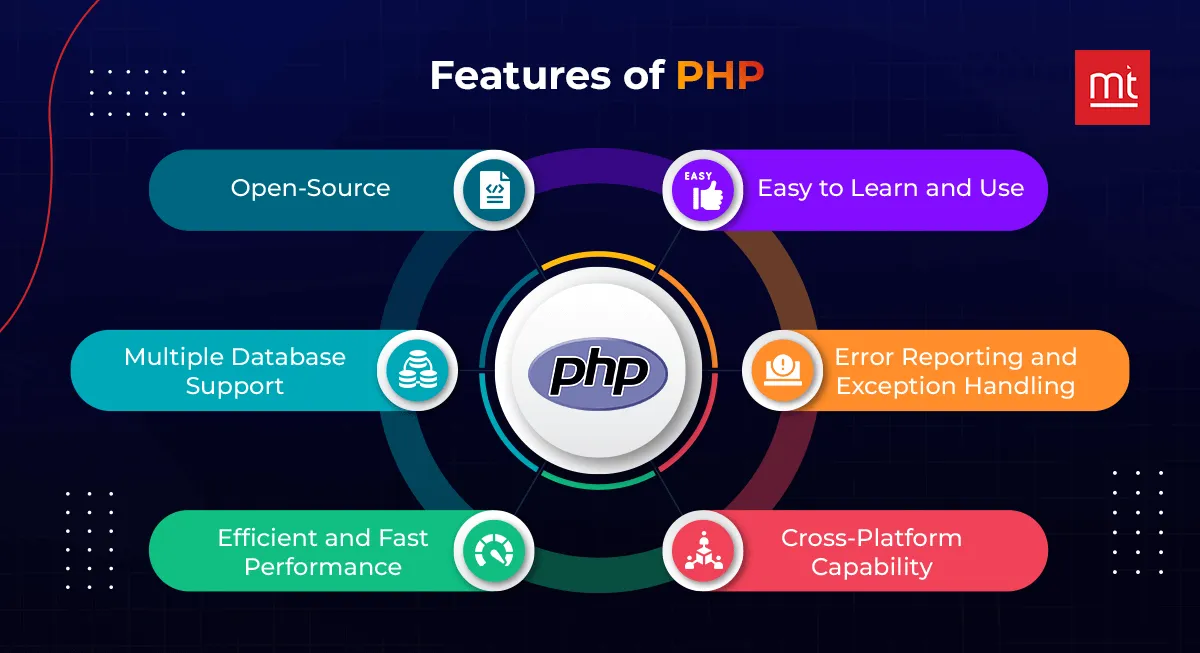
Open-Source:
PHP is an open-source scripting language that developers can download and upgrade. Depending on your web development goals, you can twist PHP and contribute to coding and bug fixing.
Easy to Learn and Use:
Compared to Python, PHP is easy to learn and use. A programmer with basic coding skills can quickly adapt to PHP and start making programs. This simple learning curve makes PHP one of the most preferred programming languages. PHP's syntax is similar to C's, with a linear and logical structure.
Multiple Database Support
PHP supports almost all databases, including MySQL, Oracle, and PostgreSQL. It also supports database integration.
Error Reporting and Exception Handling
With PHP, developers can receive error warnings through pre-defined error-reporting constants. Furthermore, it facilitates exception handling to show and fix errors.
Efficient and Fast Performance
PHP is known for its efficient and excellent performance. PHP-based applications are excellent when it comes to performance. Whether database management, mail functionality, or server administration, PHP offers faster and superior performance than other scripting languages, like ASP.NET.
Cross-Platform Capability
Developers can run PHP on any operating system, including Windows, Linux, Unix, and Mac. PHP scripts can also run on multiple devices, including computers, laptops, tablets, and mobile devices. Such cross-platform compatibility makes PHP one of the best scripting languages.
Benefits of PHP
Why should you hire PHP developers? You need to know some excellent benefits this language has to offer.
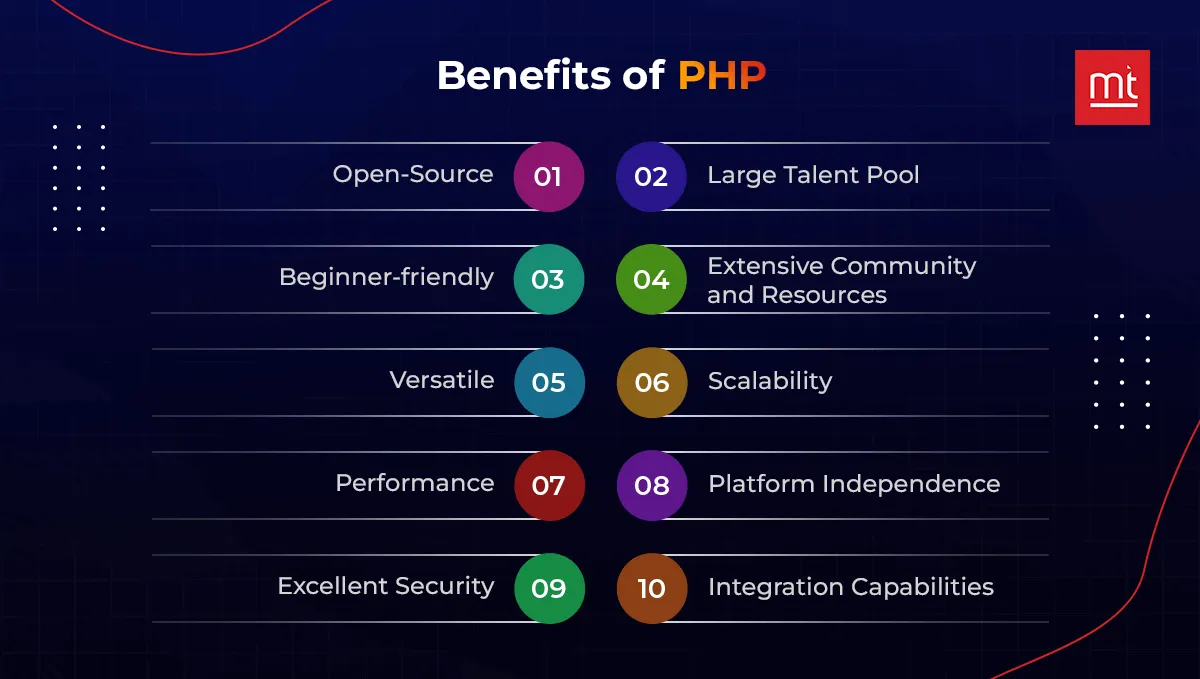
Open-source:
PHP is an open-source programming language. Users can download it for free and modify and use it according to their project requirements.
Large Talent Pool:
You can find beginners, intermediate, and experienced PHP programmers with ease. Its widespread use helps you find the best talent pool for your project.
Beginner-friendly:
As discussed earlier, PHP has a simple and linear learning curve, making it easier for beginners to develop programs than other programming languages.
Extensive community and resources:
Developers worldwide contribute to the PHP community with extensive resources, tutorials, and videos. Also, there are active online forums dedicated to PHP developers to learn and troubleshoot issues.
Versatile:
PHP is suitable for building simple blog websites and highly functional e-commerce stores. Its versatility is the main reason why it is so popular.
Scalability:
PHP is excellently suited to your scalability goals. You can start with a small website and later turn it into a multi-page website with advanced features and functionalities.
Performance:
PHP is a highly efficient and performance-oriented programming language. It also has a good execution speed and can offer optimal speed and performance.
Platform Independence:
PHP is a platform-independent language that runs on different OS, such as Windows, MacOS, Linux, and others.
Excellent Security:
A massive range of features and libraries available with PHP can help developers build highly secure and error-free websites.
Integration capabilities:
PHP also has excellent integration capabilities and can easily be integrated with popular frameworks, plugins, and databases, making the development process streamlined and seamless.
What is Python?
Python is another highly popular, well-interpreted, and object-oriented programming language. The latest version is 3.9.2, released in 2021. Python has a very clear and concise syntax, and even beginners can start with It easily. In addition, It uses significant indentation and dynamic semantics for code readability. It can be typed dynamically and supports garbage collection as well.
Python can be used in various genres, such as web development, software development, machine learning, data science, automation, and others. Though It is simple and easy to learn, developers can use it to build highly complex applications.
Python supports different programming paradigms, like structured, functional, and object-oriented programming. It makes it easy for developers to code logically and accurately for small and large-scale projects. It has many libraries for developers to build highly advanced web applications.
Features of Python
Python's features include those that make the web development process simple, quick, and cost-effective. Let's examine some Python features in detail.
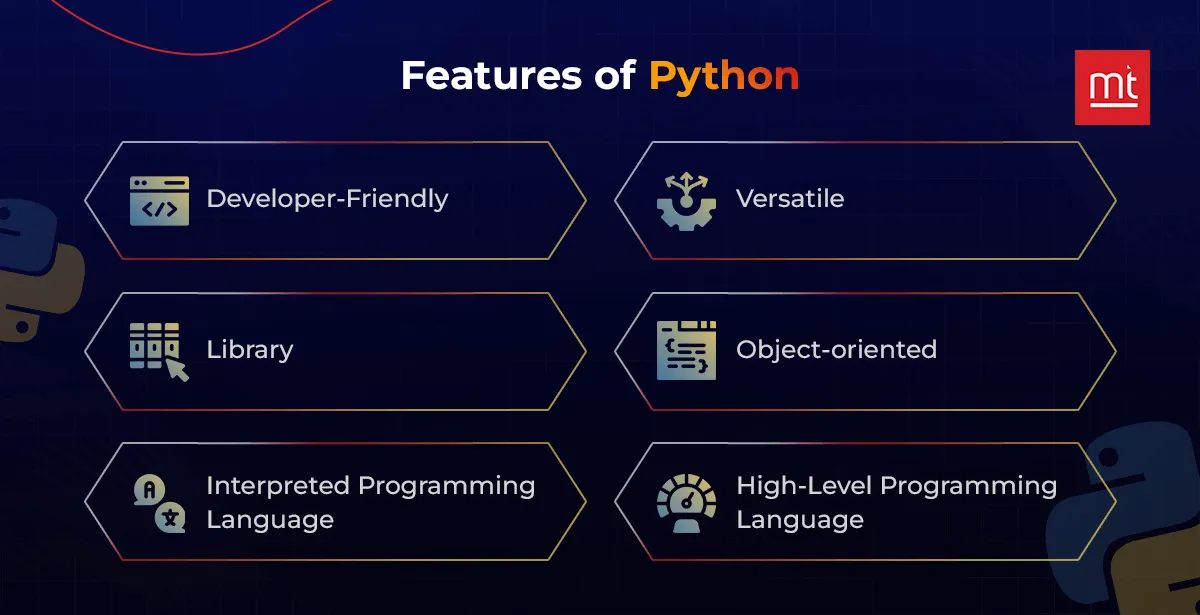
Developer-Friendly:
Python's clear syntax makes it easy for even beginners to understand and interpret. Compared to other programming languages, it closely resembles natural language.
Versatile:
Python is very versatile in its usage. Businesses can hire Python development services to build web development, data science applications, machine learning models, and automation apps.
Library:
Python saves developers time and effort. It comes with a large number of built-in modules and functions, so they don't have to write repetitive code for some common tasks.
Object-oriented:
Python supports the OOP principles of encapsulation, inheritance, polymorphism, etc., for code reusability. Developers can smartly create custom modules and libraries to extend an app's features and functionalities.
Interpreted Programming Language:
Python supports simultaneous code execution to enable faster development and debugging cycles.
High-Level Programming Language:
Furthermore, Python is typed dynamically. Hence, data type declaration is not required. However, this feature might lead to runtime errors. Also, it fundamentally focuses on problem-solving concepts to improve development efficiency.
Benefits of Python
Why should you hire a Python web development company for your next project? Let's discuss some of the benefits this language offers businesses and developers.
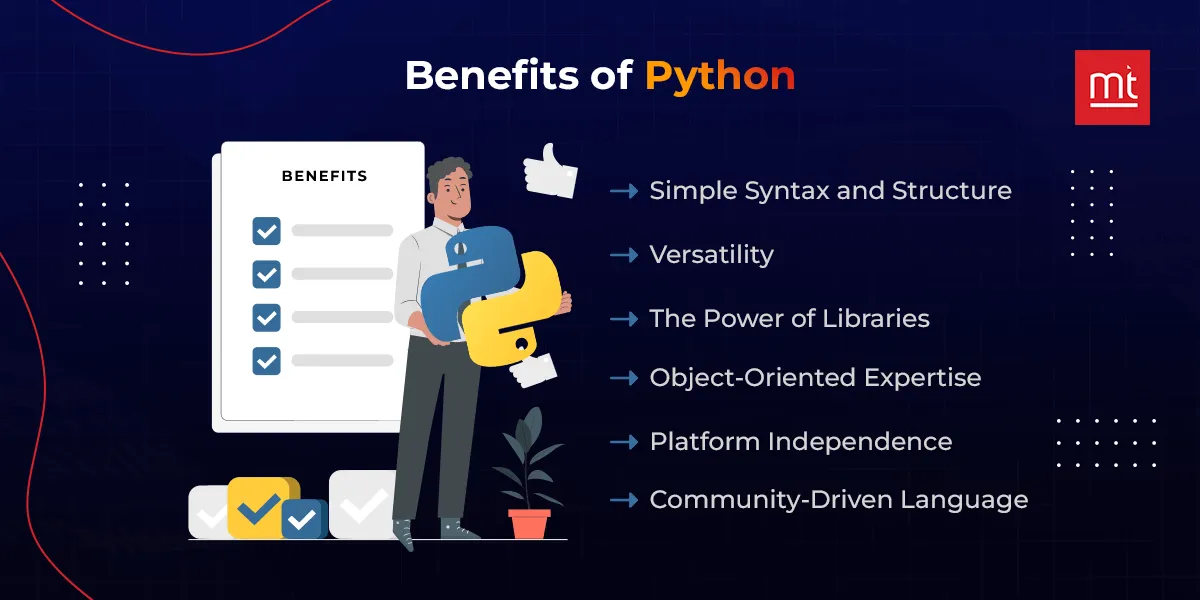
Simple Syntax and Structure
Python has a very simple and linear learning curve and a clear structure. Python code is easy to interpret, understand, and write, even for beginners. Such simplicity makes beginners confident and capable of starting.
Versatility
Python means versatility. Python is not made for just one specific domain. No matter how complex your project requirements are, Python caters to them. Whether you want to build a data science model or ML algorithms, Python empowers developers to develop diverse projects with different requirements. Developers don't need to learn various languages to build projects across various industry verticals.
The Power of Libraries
Python has a massive standard library to help developers build powerful web applications. It also has a good ecosystem of third-party libraries with ready-made code to create advanced features and functionalities. Developers can use existing solutions to build applications rather than start everything from scratch, improving the code's quality and consistency.
Object-Oriented Expertise:
Object-oriented programming principles help developers build complex apps. Developers can organize code into reusable objects to create feature-rich, scalable, powerful software and web apps. This makes the apps easy to maintain and manage.
Platform Independence
Some programming languages are built for specific platforms only. However, such platform dependence does not apply to Python. Python code can be run efficiently on almost any operating system, so developers can deploy their apps on any OS without worrying about errors and crashes.
Community-Driven Language:
Python is an open-source, server-side programming language with a thriving community that provides valuable resources such as documents, tutorials, and forums. If developers have issues during the process, they can turn to the community for instant support. Thousands of developers across the globe contribute to the community, making it vibrant and highly supportive.
A Step-By-Step Comparison Between Python and PHP
Both programming languages are good and have pros and cons, making it difficult for developers to make the correct decision. Hence, a step-by-step comparison of different criteria can help you get a clear picture.

#1. Learning Curve
PHP is the most preferred choice if you want to develop a highly sophisticated web application. Its syntax is quite similar to languages like Java and C, so developers can easily start developing apps without any issues.
However, it takes a beginner more time to learn PHP than Python. For example, PHP treats whitespaces as a free-form language. Developers have to prefix variables. However, the community is trying hard to work on this, making the curve more linear and straightforward.
On the other hand, Python is easy to learn and understand. It has a simple syntax, logical structure, and uncluttered formatting. The language uses Whitespace indentation is used to delimit blocks, and Python has fewer exceptional cases than PHP. In conclusion, Python is a clear winner regarding the learning curve.
#2. Ease of Installation
When it comes to installation, PHP undoubtedly wins the race. You can install and run it seamlessly on different operating systems like Linux, Windows, and macOS. PHP can be a good choice for businesses for small and medium-scale websites and applications.
On the other hand, installing Python can be challenging, especially on MacOS X. As it has already pre-installed an outdated Python version, you must uninstall it first and install the latest updated version.
Also, you should use a package manager called Chocolately to avoid installation issues while installing Python for Windows.
#3. Performance and Speed
Performance and speed are crucial while developing web applications. Impatient millennials want to start immediately, and they expect high-performing websites that load quickly and offer excellent user experience. Hence, you need to consider these aspects when choosing PHP or Python.
Speed and performance depend on various elements, like hardware, memory, storage space, code quality, hard disk access, etc., and the programming language you use also has a role to play in it.
The earlier versions of PHP were slow. However, the latest PHP 7.x version is ultra-fast and offers a superior performance. Also, PHP has released Zend Engine 3.0 with the PHP 7 version, making it faster than other programming languages.
On the other hand, Python also excels in performance and speed. Its code compilation process is quicker and offers a spectacular performance. When developers create or modify a file, Python converts code into bytecode.
However, if speed and performance are your priorities, Hire PHP development services, as shorter delays might impact system performance in Python.
#4. Library Support
Libraries can help developers extend the app's features and functionalities. Based on their development requirements, they can also tweak these libraries. Furthermore, using libraries reduces development time and makes testing less risky.
PHP lacks library support compared to Python. However, the latest PHP 7 version has Composer, a dependency manager that can be paired with Packagist to manage libraries effortlessly and efficiently.
On the other hand, Python has a package control tool called PIP (Pip Installs Python), making library management seamless and straightforward for developers.
In addition, if you want to build an ML-based app, Python has excellent libraries like Tensorflow, Scikit Learn, Keras, and Theano.
Integrating these libraries with the development frameworks is easy, making Python development smooth sailing.
Python wins in this category.
#5. Flexibility and Scalability:
You will need a substantial ecosystem to meet your scalability goals. Choosing the correct programming language to align with these goals is crucial.
When you compare Python vs PHP for scalability and flexibility, Python is more scalable than PHP. Though both these programming languages are capable of building high-performing and feature-rich web apps, Python wins the race as it can incorporate AI and ML capabilities into the app.
In addition, Python allows developers to embed and then unplug independent and decoupled elements during the process.
PHP is less compatible than Python when adapting new advanced technologies. Also, instant modification is complex and time-consuming with PHP.
Python wins this category easily.
#6. Security
Security is a growing concern among businesses due to advanced security breaching accidents happening worldwide. You must protect and safeguard sensitive data your customers and other stakeholders share.
Secure web applications also help you gain trust and a market reputation for your brand. Various types of security breaches can happen, like code execution, Overflow, Memory corruption, etc. You need to choose a secure programming language for your project.
PHP responds early to security threats but lacks in many areas due to loopholes and security vulnerabilities. For example, PHP might fail to secure data flow between server and client architecture.
On the other hand, Python has pre-built tools and modules to strengthen the app's security by processing each operation in a secure environment.
Security-wise, Python must be preferred over PHP.
#7. Web Framework Options
Choosing the proper framework is vital to building scalable web applications. Luckily, both Python and PHP offer developers multiple web framework options.
PHP provides frameworks like Zend, Symfony, CodeIgniter, Laravel, Yii, and Phalcon. Symfony is one of the most preferred frameworks among developers due to its low configuration requirements and optimal performance.
On the other hand, Python also supports many frameworks, such as Django, Flask, Pyramid, TurboGears, and CubicWeb. Python frameworks are known for their customization possibilities and user-friendly interfaces.
It is a clear tie when you compare PHP vs Python for web framework options. Both these programming languages are winners in this category.
#8. Debugging
Which programming language is suitable for debugging?
Why is debugging important? Applications with bugs don't perform to their capacity, and users might not like it. Also, it might invite security attacks.
A capable debugger can help identify and address bugs instantly to ensure a seamless performance and experience.
Debugging is a tricky process with PHP, as developers have to go the extra mile to complete it. However, they can always use an advanced debugging tool called XDebug to start the process.
On the other hand, Python has its dedicated debugger tool, Python Debugger. It is a user-friendly tool for starting the process, even for beginners.
Clearly, Python's debugging process is simpler than PHP's. However, you can integrate PHP and Python debugging tools with IDEs, like PyCharm and Visual Studio Code, to quicken the debugging process.
#9. Documentation
Before you choose a programming language for your project, check how rich the language's documentation is. Documentation helps developers when they encounter issues. They can instantly refer to these documents to troubleshoot issues.
Also, documentation keeps developers updated with the latest trends, news, and updates to build feature-rich applications. Hence, when you compare Python Vs. PHP, choosing a language with good documentation is preferable.
Both PHP and Python have inclusive documentation available with a few clicks. Online forums, tutorials, websites, and courses are available for both programming languages.
PHP has a dedicated website available for you. You can find almost everything about PHP on this website. Also, the website allows developers to comment on posts to give their insights. You can learn even complex concepts in a simple language with examples.
However, once a developer has posted a comment, it stays in the post forever. It might confuse new PHP developers as there is a possibility that a particular issue and its solution need to be updated.
It does not happen with Python. Python has systematically organized its documentation with a table of contents, new improvements, installed Python modules, tutorials, usages, library references, and an FAQ section.
Also, there are no comments on posts to eliminate any confusion. For the documentation category, Python wins over PHP.
#10. Environment Management
Having a steady and controlled development environment is vital to streamlining and quickening the development process. Such an environment can help teams collaborate seamlessly, mitigate risks, and speed up development and testing.
Earlier, PHP had an environment manager called virtPHP. However, it is no longer in use. Today, PHP developers rely on containers like Dockers and Kubernetes. These containers reduce overheads, offer consistent operations, increase portability, and improve efficiency and speed.
Python uses Virtualenv, an environment manager that is highly efficient and quick and offers a consistent development environment throughout the process. Furthermore, developers can install, manage, and switch between multiple Python versions simultaneously.
In the Python Vs. PHP battle for environment management, Python wins.
When To Use PHP?
PHP is the ideal choice for beginners with relatively no experience in programming. They can use PHP to build small and medium-scale projects. Also, PHP is an excellent choice for building blogging, ecommerce, and professional websites.
PHP can also be an ideal choice for websites that emphasize server-side scripting.
When To Use Python?
Python can be used to create a range of web applications. For example, if you want to build an app for database management, you can use Python. Also, if you want to incorporate AI and ML in your application, Python is a better choice.
Python is better than PHP when your project is complex and large-scale.
Conclusion
Should you hire Python or PHP development services? Well, you know the answer now. Python and PHP are competent programming languages with pros and cons. You must define your project requirements and scalability goals to choose the correct programming language.
For example, if you want to incorporate AI and ML capabilities into your project in the future, choose Python. If you are working on a simple blogging website with no advanced features, go for PHP.
We have discussed and compared PHP and Python for various criteria to give you a clear idea of which programming language to choose for your project.
You can hire remote developers from ManekTech to build impeccable, feature-rich, scalable websites and web applications. Our team of remote developers can work as your in-house team to deliver future-ready solutions that stand the test of time.
Subscribe to Our Newsletter!
Join us to stay updated with our latest blog updates, marketing tips, service tips, trends, news and announcements!




